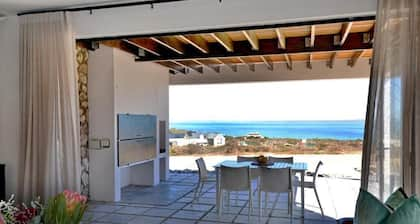
Travel to West Coast National Park
- Plan, book, travel with confidence
Better together
Save up to RM 324 when you book a flight and hotel together*
Find the right fit
With over 300,000 hotels worldwide, it's easy to create a perfect package
Rest easy
Plan, book, and manage your trip all in one place
Top hotels in West Coast National Park

The Farmhouse Hotel
5 Egret Street, Langebaan, Western Cape
Fully refundableReserve now, pay when you stay
The price is RM344 per night from 1 May to 2 May
RM344
RM398 total
includes taxes & fees
1 May - 2 May
8.6/10 Excellent! (84 reviews)
Relaxing location
"Superb peaceful location looking out over the lagoon. Bedrooms were charming although it was too easy to hear children in next door room - in the early hours of the morning. Breakfast and dinner were superb - excellent menus all cooked beautifully."
Reviewed on 3 Mar 2025

The Shark Bay Private Villas
8 Grysbok Cl, Langebaan, Western Cape
The price is RM586 per night from 4 May to 5 May
RM586
RM677 total
includes taxes & fees
4 May - 5 May
9.4/10 Exceptional! (7 reviews)
Amazing place
"Our stay was perfect…..the self-catering unit was clean and had all the basics to enjoy a weekend away. I will 100% stay at this property again."
Reviewed on 23 Feb 2025

The Shark Bay Boutique Hotel & Spa
8 Grysbok Close, Shark Bay, Langebaan, Western Cape
The price is RM427 per night from 4 May to 5 May
RM427
RM494 total
includes taxes & fees
4 May - 5 May
6.4/10 (10 reviews)
"Such a beautiful location and the hotel could do so much better. Disappointing as the windows in the room were dirty so it ruined the beautiful view. Bathroom ceiling had a hole and sheets had stains. The outside and lounge areas are lovely."
Reviewed on 1 Sep 2024
Lowest nightly price found within the past 24 hours based on a 1 night stay for 2 adults. Prices and availability subject to change. Additional terms may apply.
More trip options
Expedia's Latest Trends
Hotels
Hotels with Airport Shuttle in MiriHotels near A' Famosa Water Theme ParkHotels in JasinKempinskiHotelsResorts Hotels in Siem ReapLiving Asia Resort & SpaBeach Resorts in CheratingRoyal Emporium Incheon Airport HotelHotel Grand MutiaraMai House Saigon HotelHotels in Kampung Jawa5 Star Hotels in Port DicksonAndaman Embrace PatongHotels near Orchard RoadMotels PenangChalets MalaysiaUrban Escapes - Bell Suites
Flights
Flights from Singapore (SIN) to San Francisco (SFO)Flights from Sepang (KUL) to Khlong Hoi Khong (HDY)Flights from Sepang (KUL) to Sapporo (CTS)Flights from Sepang (KUL) to Düsseldorf (DUS)Flights from George Town (PEN) to Langkawi (LGK)Flights from Sepang (KUL) to Cox's Bazar (CXB)Flights from New York (JFK) to George Town (PEN)Flights from Sepang (KUL) to Xuzhou (XUZ)
* Savings based on package bookings compared to the price of the same components booked separately. Savings not available on all packages.